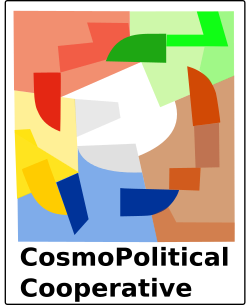The CosmoPolitical Cooperative acts throughout the European Union, for the benefit of all its citizens. Its social project is egalitarian and democratic. This is also reflected in our language rules. Everyone must have the tools to interact with the other Cooperators sincerely, quickly and effortlessly, without their native language being an advantage or a handicap – while keeping the Cooperative's operating budget compatible with monthly membership fees accessible to all.
Language rules
To this end, we propose the following rules:
- the long-term ambition of the CosmoPolitical Cooperative is that the egalitarian planned international language Esperanto should serve as a free, resource-saving medium of communication between its members. This is why Esperanto is, together with English, one of the official languages of the Cooperative;
- in the shorter term :
- interactions (meetings, discussions, exchange of arguments, elaboration and adoption of Action Proposals) between people with different native languages are done in writing, on our online tools. Oral interactions are dedicated to meetings between people sharing the same native language, or explicitly and a priori agreeing to exchange in a common language;
- during discussions and exchanges of arguments between members of our Community (in real time meetings, on discussion threads, around Action Proposals...), where each person expresses himself or herself in his or her own name, each person writes in his or her own native language, preceding his or her intervention with the 2-letter language code (en for English). The readers use automatic translation tools (see below) to translate them into their own native language;
- the common documents elaborated by several people (such as the Action Proposals, the methodological guides, the situation analyses...) are written in one of the official languages of the Cooperative (English or Esperanto). Everyone contributes in the language of the document, having translated it from their own native anguage into that language, if necessary using automatic tools (see below).
Cost-free tools to follow these rules easily
We recommend the use of the free automatic translation tools provided by the German company DeepL, for their quality, but also for their compliance with the European rules on the confidentiality of personal data (GDPR). More specifically, we recommend that you:
- add the (cost-free) extension offered by DeepL to your browser: Firefox - Chrome - Microsoft Edge;
- activate this extension, by clicking on the small logo DeepL at the top right of the browser window, and select (1) the language (your native language or one you understand) into which you want to translate the text you are reading, and (2) the language (usually English) into which you are translating the text you are writing in your language;
- once the extension is activated, open the Cooperative's online tools on this browser;
- to translate a text written in another language (among those proposed by DeepL) into your language, select the text with your mouse on the browser window. A button with the DeepL logo appears. Click on this button. The translation of the text into the language of your choice will appear. That's it!
- To translate text that you write in your own language into a target language (generally: English), select the text you want to translate. If you are writing in a text-only web frame, the DeepL button appears on the bottom right. Click on it, and your selected text is translated into English. Done! If you write in a different type of frame, right click on your text. In the menu an item 'translate this selection' appears. Choose this item. A window appears with the translated text and a copy icon. Click on it to copy the translated text and then paste it wherever you want. That's it!
